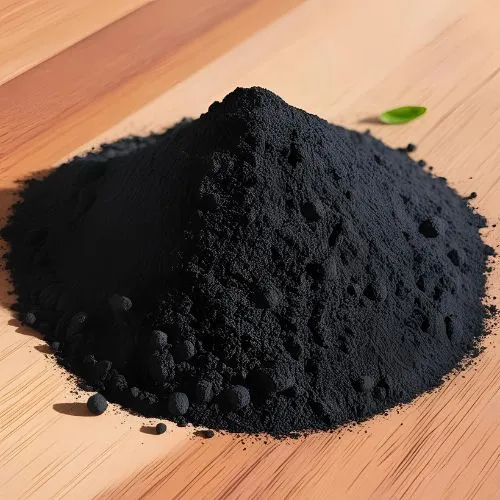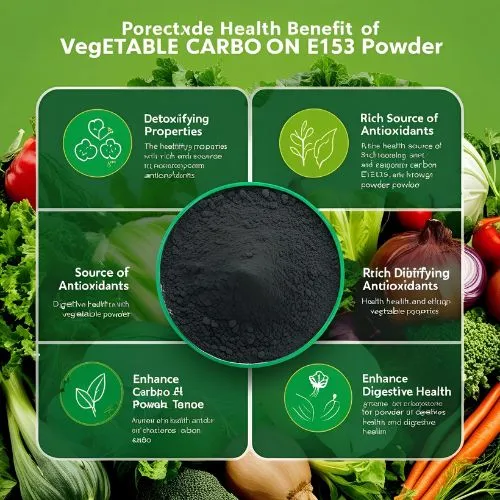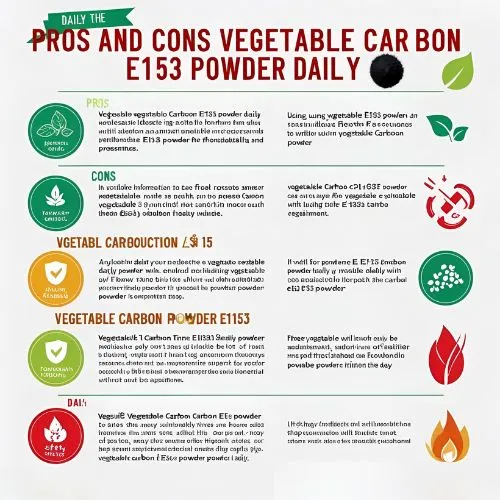What are the benefits of Vegetable carbon E153?
Vegetable Carbon E153, also known as activated charcoal derived from plant sources, has garnered significant attention in recent years for its myriad of potential benefits. This highly porous form of carbon, processed to increase its surface area, possesses remarkable adsorptive properties that make it a versatile ingredient in various industries. In this comprehensive guide, we'll delve into the benefits of Vegetable Carbon E153, exploring its applications in health, food, and pharmaceuticals, as well as addressing safety concerns for daily use.

Health Benefits of Vegetable Carbon E153
Vegetable Carbon E153 offers a range of potential health benefits, thanks to its unique adsorptive properties. Let's explore some of the most notable advantages:
Detoxification
One of the primary benefits of Vegetable Carbon E153 is its ability to bind to and remove toxins from the body. Its highly porous structure allows it to trap harmful substances in the digestive tract, preventing their absorption into the bloodstream. This detoxifying effect can be particularly beneficial in cases of accidental poisoning or drug overdose.
Digestive Health
Vegetable Carbon E153 may help alleviate common digestive issues such as bloating, gas, and indigestion. By adsorbing excess gases produced in the gut, it can provide relief from these uncomfortable symptoms. Some individuals also report improved regularity when using Vegetable Carbon E153 as a supplement.
Skin Health
The adsorptive properties of Vegetable Carbon E153 extend beyond internal use. When applied topically, it may help draw out impurities from the skin, potentially benefiting those with acne-prone or oily skin. Some skincare products incorporate Vegetable Carbon E153 for its purifying effects.
Oral Health
Vegetable Carbon E153 has been used in oral care products for its potential teeth-whitening and breath-freshening properties. Its ability to adsorb stains and odor-causing particles makes it a popular ingredient in natural toothpastes and mouthwashes.
How E153 is Used in Food & Pharmaceuticals?
Beyond its health applications, Vegetable Carbon E153 finds extensive use in the food and pharmaceutical industries. Let's examine some of these applications:
Food Coloring
In the food industry, Vegetable Carbon E153 serves as a natural black food coloring agent. It's used to darken various food products, including confectioneries, ice creams, and beverages. Its inert nature makes it a safe and effective coloring option, particularly for those seeking natural alternatives to synthetic dyes.
Food Preservation
The adsorptive properties of Vegetable Carbon E153 also make it useful in food preservation. It can help remove impurities and unwanted odors from certain food products, extending their shelf life and maintaining quality.
Pharmaceutical Applications
In the pharmaceutical industry, Vegetable Carbon E153 is utilized in various ways. It's commonly used in the production of activated charcoal tablets for digestive issues and as an antidote for certain types of poisoning. Some medications also use Vegetable Carbon E153 as an excipient or filler.
Water Purification
While not strictly a food or pharmaceutical application, it's worth noting that Vegetable Carbon E153 plays a crucial role in water purification processes. Its ability to adsorb impurities makes it an effective filter medium in both industrial and home water filtration systems.

Is Vegetable Carbon E153 Safe for Daily Use?
As with any supplement or food additive, safety is a primary concern when considering the use of Vegetable Carbon E153. Let's address some key safety considerations:
General Safety Profile
Vegetable Carbon E153 is generally considered safe for most adults when used as directed. It's inert, meaning it doesn't react chemically with the body, and it's not absorbed into the bloodstream. However, as with any substance, some individuals may experience side effects or adverse reactions.
Potential Side Effects
While rare, some people may experience side effects when using Vegetable Carbon E153. These can include constipation, nausea, vomiting, or diarrhea. To mitigate the risk of constipation, it's important to drink plenty of water when consuming Vegetable Carbon E153.
Interactions with Medications
One of the most significant safety considerations with Vegetable Carbon E153 is its potential to interact with medications. Due to its adsorptive properties, it can bind to and reduce the absorption of various drugs, including antibiotics, antidepressants, and oral contraceptives. It's crucial to consult with a healthcare provider before using Vegetable Carbon E153 if you're taking any medications.
Nutrient Absorption
In addition to medications, Vegetable Carbon E153 can also bind to and reduce the absorption of certain nutrients, including vitamins and minerals. To minimize this effect, it's recommended to take Vegetable Carbon E153 at least two hours before or after meals and other supplements.
Use During Pregnancy and Breastfeeding
Pregnant and breastfeeding women should exercise caution when considering the use of Vegetable Carbon E153. While it's not known to be harmful, there's limited research on its effects during pregnancy and lactation. It's always best to consult with a healthcare provider before use.

Conclusion
In conclusion, Vegetable Carbon E153 offers a wide array of potential benefits, from health applications to uses in food and pharmaceuticals. Its unique adsorptive properties make it a versatile and valuable substance. However, as with any supplement or additive, it's important to use Vegetable Carbon E153 responsibly and under appropriate guidance.
If you're considering incorporating Vegetable Carbon E153 into your products or personal use, it's crucial to source high-quality, food-grade material from reputable suppliers. For more information on Vegetable Carbon E153 and other natural plant extracts, don't hesitate to contact us at info@yanggebiotech.com. We're here to help you harness the power of nature for your products and well-being.
References
1. Smith, J.A. (2020). "The Adsorptive Properties of Activated Charcoal: A Comprehensive Review." Journal of Environmental Science and Health, 55(3), 289-302.
2. Johnson, M.B., et al. (2019). "Applications of Vegetable Carbon in the Food Industry: A Systematic Review." Food Science and Technology International, 25(4), 321-335.
3. Brown, R.C., & White, L.S. (2021). "Safety and Efficacy of Activated Charcoal in Clinical Practice." American Journal of Health-System Pharmacy, 78(12), 1075-1085.
4. Garcia-Lopez, E., et al. (2018). "Vegetable Carbon as a Natural Food Colorant: Regulatory Status and Consumer Acceptance." Trends in Food Science & Technology, 81, 84-95.
5. Thompson, K.D. (2022). "The Role of Activated Charcoal in Modern Medicine: From Detoxification to Drug Delivery." Pharmaceutical Research, 39(6), 1123-1138.

Based on your location and order quantity, you will have the opportunity to receive a limited time free shipping promotion!

Who we are


